John Groves
Operetta Research Center
2 March, 2018
Theater Augsburg is in the midst of refurbishment, so the various ensembles have decamped to several venues around the city. This includes a sports hall in Martini Park, which appears to have been converted from a disused industrial building: a lovely venue in summer – not so good when the snow is 15 cm thick and there is a ten minute walk from the nearest tram stop. But I had wanted to see Paul Abraham’s Roxy und ihr Wunderteam again, ever since I first encountered it at Dortmund in 2015.
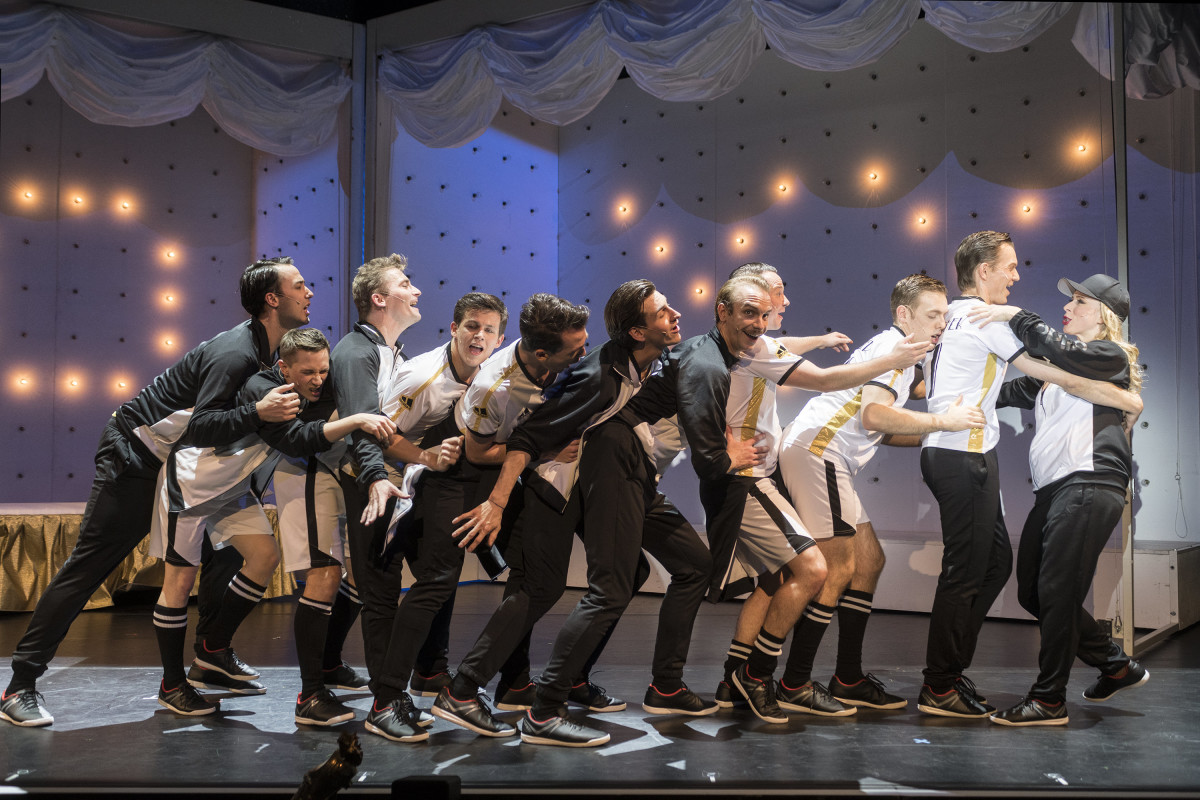
“Roxy und ihr Wunderteam” in Augsburg with Christian Bindert, Stephan Luethy, Arne David, Joshua Hien, Max Menendez Vazquez, Florian Weigel, Julian Bender, Konstantin Krisch, Dennis Weissert, Uli Scherbel, Katja Berg (left to right). (Photo: Jan-Pieter Fuhr)
It is a lightweight piece of hilarious nonsense, or should be, but it is not one of Abraham’s strongest operettas. He was running from Nazism at the time of its composition in 1937. The plot originally concerned Scots girl, Roxy, who goes mad over the national football team, who hand out a thrashing to the English football team. In the first German language production at Vienna’s Theater an der Wien this was the Austrian national football team, also in the Austrian film version which has a glorious group of men in shorts on offer; in the Hungarian version it’s a water polo team, which allows for the display over even more male body parts as an integral aspect of the sex-farce-story. Because the joke of the show is that these sports heroes are supposed to stay away from girls and intercourse with girls, so they can fully focus on their next sports victory. A plan that goes dramatically amiss once a female gymnastics club arrives at the training camp, and hormones start bubbling up. Which leads to some of the most amusing moments in operetta history, as a spoof of Leni Riefenstahl’s Olympia aethetic and Aryan superiority nonsense, certainly when Rosy Barsony plays Roxy and leads a group of lusty gymnasts to a victory of the flesh (and the human) over ideological dogmas; Miss. Barsony did so in the original stage versions and in the film. She’s quite irresistible and makes the simple “vaudeville” score buzz. (And obviously everything in this 1937 score is ‘degenerate’ by the Nazi definition of music; so combined with the sports spoof it’s a double parody of Fascist ideals that drove Abraham & Co. into exile.)
Musically, the Augsburg production can be considered a success. The orchestra under Lancelot Fuhry played the Hagedorn and Grimminger arrangements/reconstruction with panache and a style befitting the 1930s. It was a shame that they were positioned as far upstage as was possible behind all the scenery, as they lacked impact and in fact at first I wondered if the accompaniment was not ‘live’ but a backing track. On the rare occasions that the set disappeared, they emerged in full glory – just too rarely!
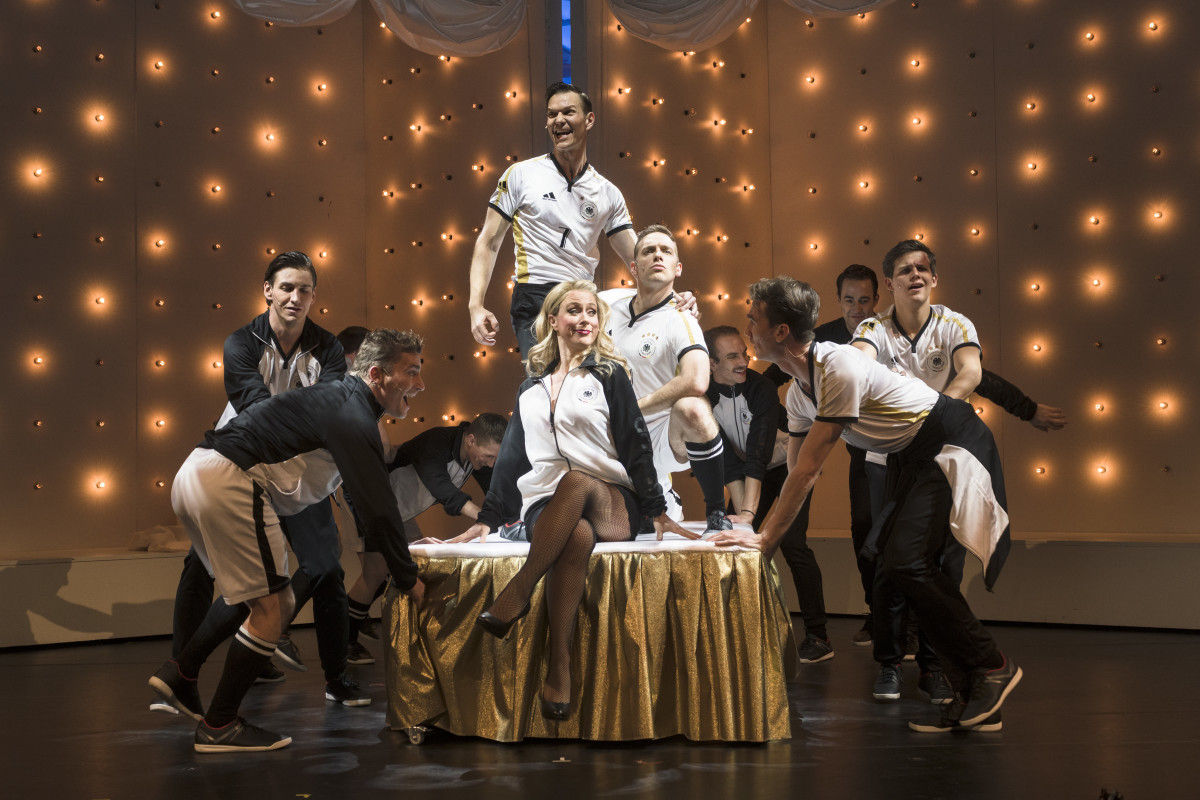
“Roxy und ihr Wunderteam” in Augsburg with Arne David, Florian Weigel, Stephan Luethy, Uli Scherbel, Katja Berg, Dennis Weissert, Julian Bender, Max Menendez Vazquez, Christian Bindert, Joshua Hien (left to right.) (Photo: Jan-Pieter Fuhr)
The driving force in this show is Roxy herself, and Katja Berg was able to fulfil this role with terrific energy as singer and dancer; as the footballer (named Phillipp) whom she eventually falls for, Thaisen Rusch proved that as well as singing, he also has some footballing skills. Roxy teaming up with Phillipp is new, and not the original plot.

Katja Berg as Roxy and Thaisen Rusch as Phillippin bed in “Roxy und ihr Wunderteam” in Augsburg. (Photo: Jan-Pieter Fuhr)
Markus Hauser as Sam Cheswick, surely the most unhealthy football manager in history, has the most memorable song in the operetta and while not eclipsing memories of the originator of the role, Oscar Denes, was great fun to watch. He appears together with former real life football star Jimmy Hartwig; his participation has brought hoards of football fans to this show who would otherwise not have bothered with a blackwalk operetta from 1937.
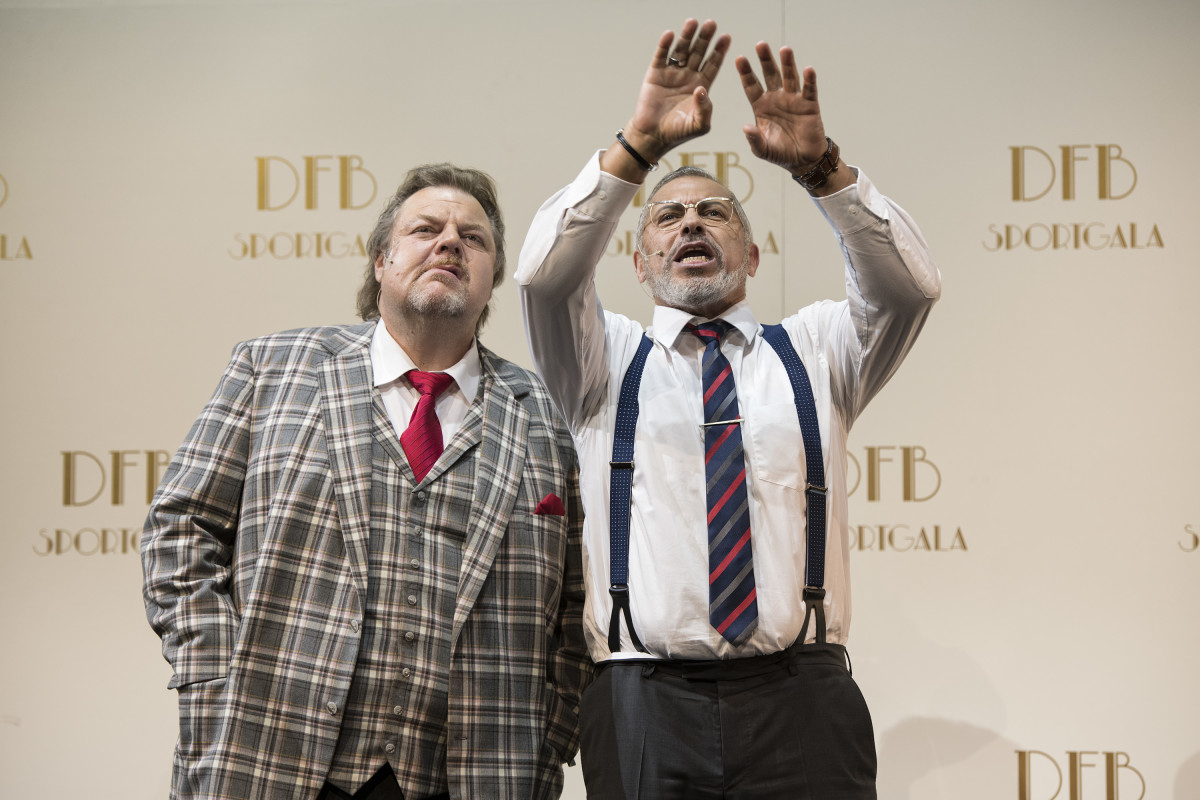
Markus Hauser and Jimmy Hartwig in “Roxy und ihr Wunderteam” in Augsburg. (Photo: Jan-Pieter Fuhr)
Perhaps most successful were the various members of the Football Team, who not only created individual roles, but also tap dance in football boots. One of the best among them was Uli Scherbel as Christiano Hatschek, another re-written role and in the original version the male jeune primier who is having the affair with Roxy. (Here, his affair is with Bobby Cheswick, played by tall Dutch bartitone Wiard Witholt.) You might remember Mr. Scherbel from the Maske in Blau production at Theater Baden (which I reviewed in January) were he also tap danced his way into the hearts of the audience.
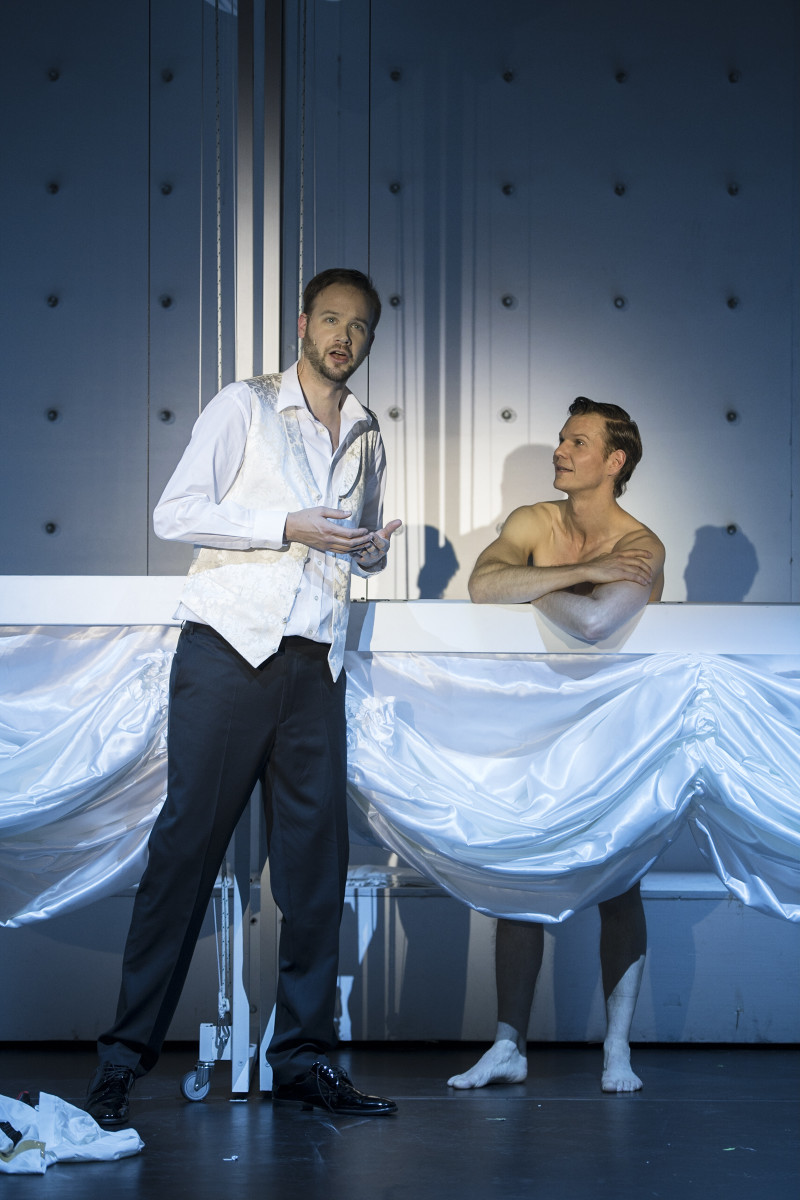
Wiard Witholt (l.) and Uli Scherbel as surprise lovers in “Roxy und ihr Wunderteam” in Augsburg. (Photo: Jan-Pieter Fuhr)
Whether or not the imaginative choreographer, Marie-Christian Zeisset, realised the noise that this would make on a hollow wooden stage is not known. But it was deafening.
In fact, all the musical numbers were creatively and amusingly staged by Ms Zeisset, to whom much credit should go for the success of this production.
The sets, designed by Sarah-Katharine Karl were clearly rather cumbersome to move around the stage, which was done by the actors, but stage facilities were doubtless limited. Costumes, by Silke Bornkamp, added to the visual impact of the show.
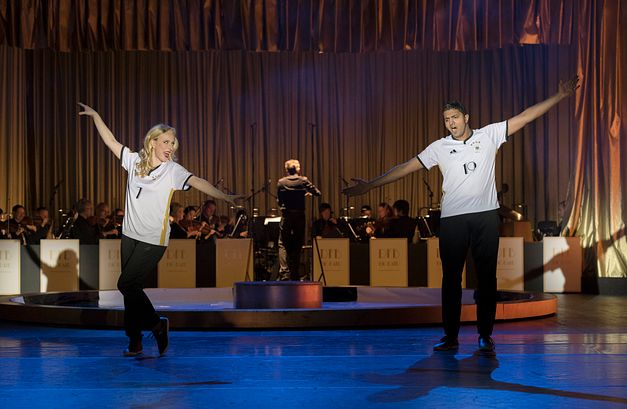
Katja Berg and Thaisen Rusch dancing in “Roxy und ihr Wunderteam” with the orchestra visible in the background. (Photo: Jan-Pieter Fuhr)
I have already said that Roxy und ihr Wunderteam is a featherweight, frothy piece of entertainment and needs careful, light-touch handling by the director. This production under review unfortunately received heavy-handed treatment from its director, Martin C Berger. Besides changing the plot to Germany v Spain, which is understandable, he decided to stage the piece in flashback, which involved not only a ten minute video before the operetta itself began, but also long, irrelevant speeches after the Finale to the last act, which meant that the production ended on an anti-climax – the applause being lukewarm at best.
In addition, he decided to add a sub-plot of a gay relationship which is just not there in the original. So instead of the football lads falling for the ladies of the gymnastics club, there are no ladies at all – but only boys, boys, boys. Under the shower.
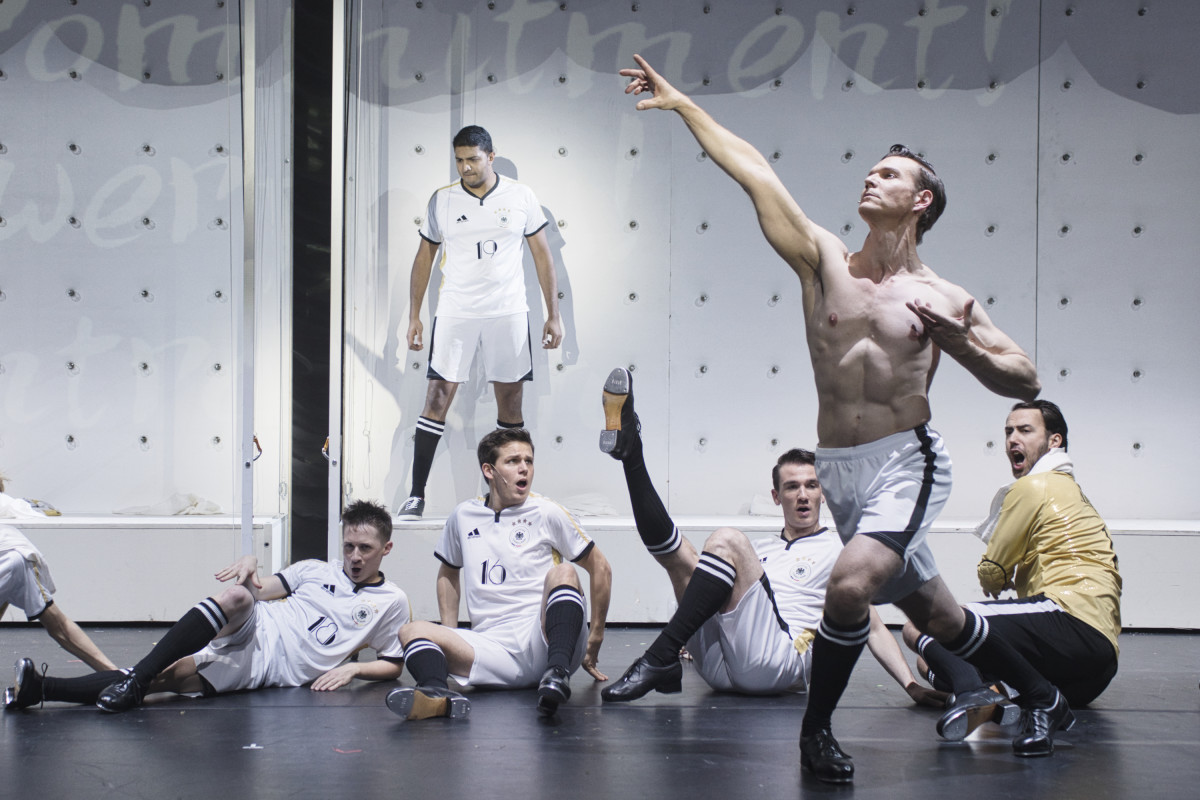
Strike a pose, there’s nothing to it: Uli Scherbel (r.) showing his team how to do it with style. (Photo: Jan-Pieter Fuhr)
However, perhaps the weakest aspect of this staging was the lighting (Marco Vitale). He relied heavily on the use of a follow spot (apparently only one!) which frequently lit the wrong actor. For example at the end of Act One where Roxy is singing, the spot was firmly on Philipp. This occurred time and time again. The follow spot operator also appeared to be in need of training as s/he was unaware of how to focus the spot in size or space!
In addition, it is obvious that if you have two actors on either side of the stage you cannot light both with one spot. Mr Vitale tried to – often!
Also, lighting cues were often ‘wrong’: at one point when almost the entire cast is having a shower in Act Two the lights on one side of the stage clicked off for about ten seconds, until someone realised the mistake. This probably accounted for the loud continual talking in the lighting and sound booth, which could be clearly heard throughout the rear half of the theatre. Very unprofessional, and most unusual!
Yes, I was disappointed! Roxy is by no means one of Abraham’s best operettas, but, as the Dortmund production proved and as the old film version documents, it can and should be lots of fun. The fun at Augsburg was intermittent, I am afraid!
For more information, full cast and performance dates click here.

I hate to quibble with such a well-written piece, but I’ve seen the Hungarian version of the film, 3 : 1 a szerelem javára, and it’s definitely about a football team.
Yes, it is. It’s the same basic story as the German film version. But the Hungarian stage version involves a water polo team. (Maybe it was too expensive in 1937 to film two radically different movies in German and Hungarian?) To this day, the Hungarians mostly play the water sports version, while… Germany is now getting the football option. It would be great to have the film on DVD, because Barsony is simply outstanding.